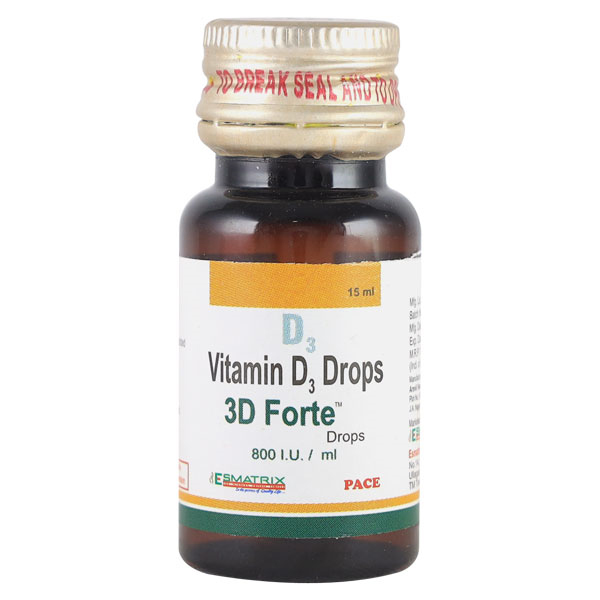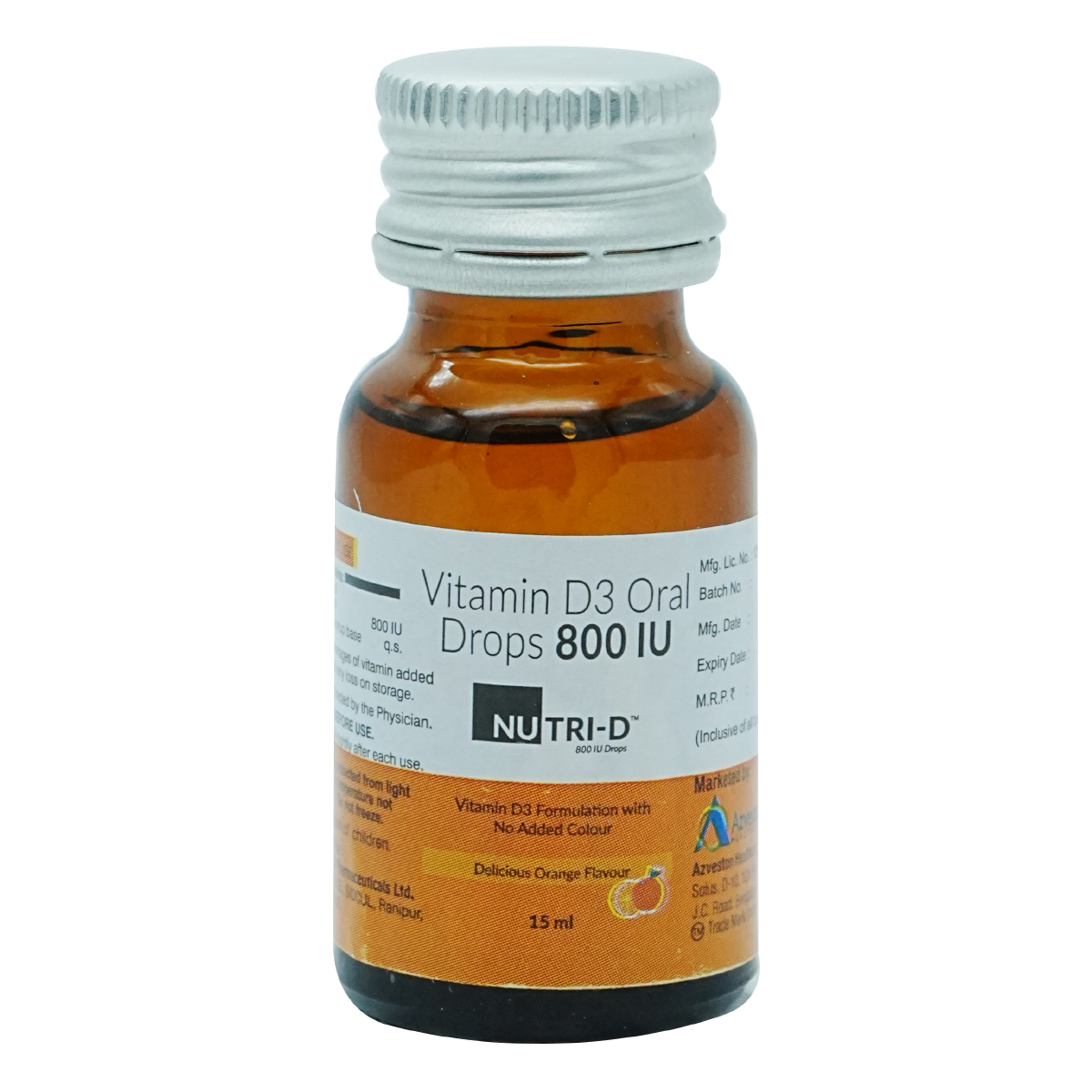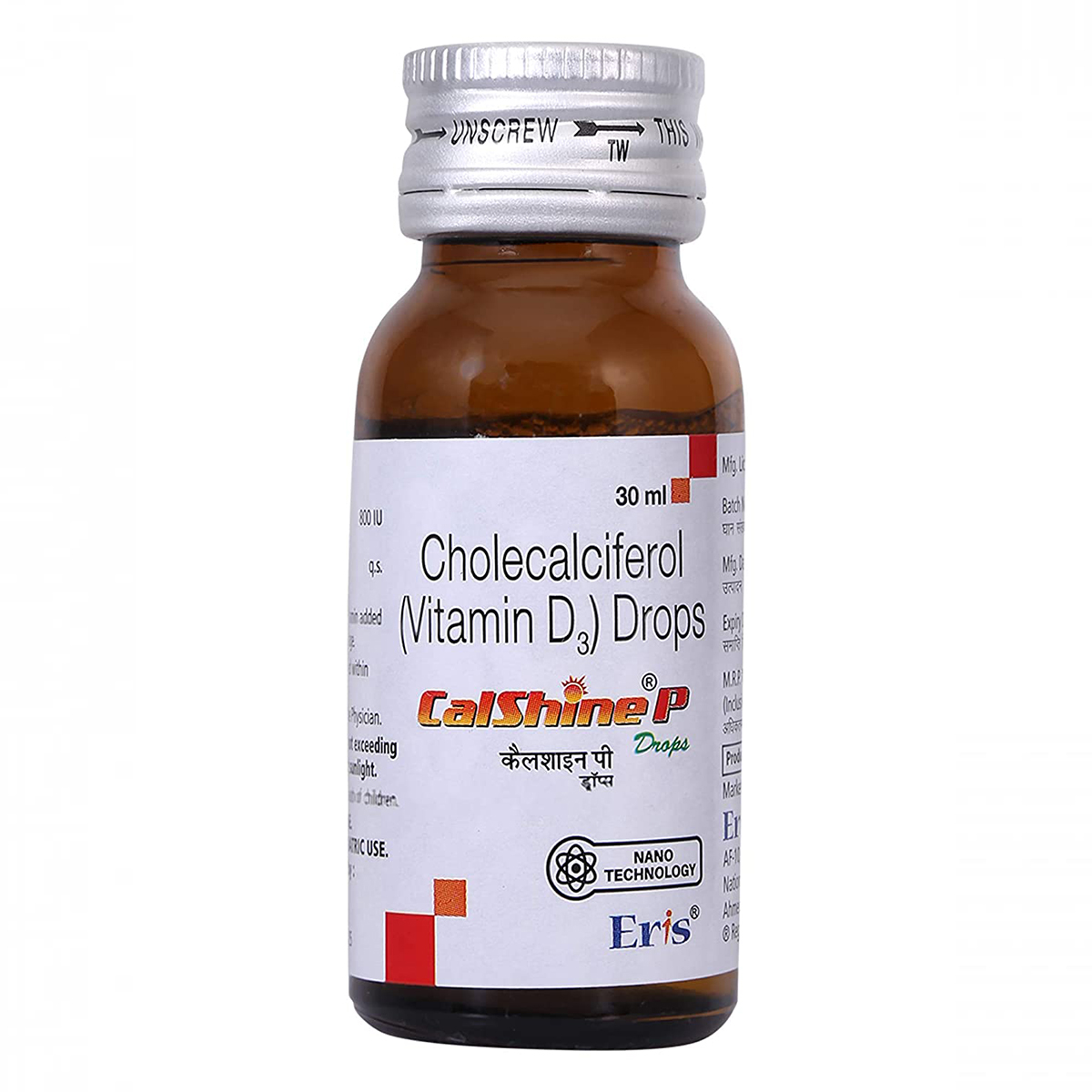Bluvit D3 800IU Drop
MRP ₹75
(Inclusive of all Taxes)
₹11.3 Cashback (15%)



Available Offers
Therapeutic Class
Drug-Drug Interactions Checker List
- CHOLESTYRAMINE
- CARBAMAZEPINE
- PHENOBARBITAL
- DOXYCYCLINE
- NEOMYCIN
- CHLORAMPHENICOL
- ALENDRONATE SODIUM
- LEVOTHYROXINE
- HYDROCHLOROTHIAZIDE
- DIGOXIN
Drug-Drug Interactions
Drug-Drug Interactions
Login/Sign Up
Cholecalciferol and doxercalciferol are forms of vitamin D, and taking too much vitamin D may lead to toxic effects.
How to manage the interaction:
Although there is a possible interaction between Bluvit D3 800IU Drop 30 ml and doxercalciferol, you can take these medicines together if prescribed by your doctor. If you notice any of these symptoms - irregular heartbeat, seizures, weakness, tiredness, headache, dizziness, ringing in the ears, loss of appetite, feeling sick, dry mouth, strange taste in your mouth, muscle or bone pain, thirst, losing weight, eye infection, sensitivity to light, runny nose or itching - make sure to call a doctor right away. Do not discontinue any medications without consulting a doctor.
The combined use of calcifediol with cholecalciferol can increase the risk of side effects.
How to manage the interaction:
Although there is a possible interaction between Bluvit D3 800IU Drop 30 ml and calcifediol, you can take these medicines together if prescribed by your doctor. If you notice any of these symptoms - irregular heartbeat, seizures, weakness, tiredness, headache, dizziness, ringing in the ears, loss of appetite, feeling sick, dry mouth, strange taste in your mouth, muscle or bone pain, thirst, losing weight, eye infection, sensitivity to light, runny nose or itching - contact a doctor right away. Do not discontinue any medications without consulting a doctor.
The combined use of cholecalciferol and paricalcitol are forms of vitamin D, and taking too much vitamin D may lead to toxic effects.
How to manage the interaction:
Although there is a possible interaction between Bluvit D3 800IU Drop 30 ml and paricalcitol, you can take these medicines together if prescribed by your doctor. If you notice any of these symptoms - irregular heartbeat, seizures, weakness, tiredness, headache, dizziness, ringing in the ears, loss of appetite, feeling sick, dry mouth, strange taste in your mouth, muscle or bone pain, thirst, losing weight, eye infection, sensitivity to light, runny nose or itching - contact a doctor right away. Do not discontinue any medications without consulting a doctor.
The combined use of cholecalciferol and ergocalciferol are forms of vitamin D, and taking too much vitamin D may lead to toxic effects.
How to manage the interaction:
Although there is a possible interaction between Bluvit D3 800IU Drop 30 ml and ergocalciferol, you can take these medicines together if prescribed by your doctor. If you notice any of these symptoms - irregular heartbeat, seizures, weakness, tiredness, headache, dizziness, ringing in the ears, loss of appetite, feeling sick, dry mouth, strange taste in your mouth, muscle or bone pain, thirst, losing weight, eye infection, sensitivity to light, runny nose or itching - contact a doctor right away. Do not discontinue any medications without consulting a doctor.
Co-administration of Cholecalciferol and Calcitriol are forms of vitamin D, and taking too much vitamin D may lead to toxic effects.
How to manage the interaction:
Although there is a possible interaction between Bluvit D3 800IU Drop 30 ml and calcitriol, you can take these medicines together if prescribed by your doctor. If you notice any of these symptoms - irregular heartbeat, seizures, weakness, tiredness, headache, dizziness, ringing in the ears, loss of appetite, feeling sick, dry mouth, strange taste in your mouth, muscle or bone pain, thirst, losing weight, eye infection, sensitivity to light, runny nose or itching - contact a doctor right away. Do not discontinue any medications without consulting a doctor.
The combined use of aluminum hydroxide with Bluvit D3 800IU Drop 30 ml may increase the risk of toxicity.
How to manage the interaction:
Co-administration of Bluvit D3 800IU Drop 30 ml with Aluminium hydroxide can possibly result in an interaction, but it can be taken if your doctor has advised it. If you're having any of these symptoms like bone pain, muscle weakness, anemia, seizures, or dementia, it's important to contact your doctor right away. Do not stop using any medications without a doctor's advice.
Taking Cholecalciferol together with Sucralfate may increase the risk or severity of kidney problems.
How to manage the interaction:
There may be a possibility of interaction between Cholecalciferol and Sucralfate, but it can be taken if prescribed by a doctor. Do not discontinue any medications without consulting a doctor.
Cholecalciferol and dihydrotachysterol are forms of vitamin D, and taking too much vitamin D may lead to toxic effects.
How to manage the interaction:
Although there is a possible interaction between Bluvit D3 800IU Drop 30 ml and dihydrotachysterol, you can take these medicines together if prescribed by your doctor. If you notice any of these symptoms - irregular heartbeat, seizures, weakness, tiredness, headache, dizziness, ringing in the ears, loss of appetite, feeling sick, dry mouth, strange taste in your mouth, muscle or bone pain, thirst, losing weight, eye infection, sensitivity to light, runny nose or itching - contact a doctor right away. Do not discontinue any medications without consulting a doctor.
Drug-Food Interactions
Drug-Food Interactions
Login/Sign Up
Drug-Diseases Interactions
Drug-Diseases Interactions
Login/Sign Up
Drug Warnings
Tell your physician if you are allergic to Bluvit D3 800IU Drop. Chewable or dissolving tablets may contain sugar or aspartame, hence caution should be taken in diabetes and phenylketonuria (increased levels of an amino acid called phenylalanine). Pregnant or breastfeeding women should consult their physician before taking Bluvit D3 800IU Drop. Higher doses of Vitamin D than the recommended daily dose should be used in pregnant women only when advised by the doctor. Bluvit D3 800IU Drop passes into the breast milk, hence breastfeeding mothers need to seek medical advice before starting Bluvit D3 800IU Drop. Bluvit D3 800IU Drop is safe to use in children when advised by the doctor. Bluvit D3 800IU Drop should be used with caution in hypercalcemia, hyperparathyroidism, renal impairment, electrolyte imbalance, heart diseases, kidney stones and hypervitaminosis D (having too much vitamin D).
Side Effects of Bluvit D3 800IU Drop
- Constipation
- Increased blood calcium levels
- Increased calcium levels in urine
- Vomiting
- Nausea
- Chest pain, feeling short of breath
Directions for Use
Medicinal Benefits Mweb
Key Benefits
Bluvit D3 800IU Drop is used to treat low blood calcium levels. It effectively treats various conditions in the body like Vitamin D deficiency, osteoporosis, hypoparathyroidism, latent tetany and rickets or osteomalacia. Bluvit D3 800IU Drop contains Cholecalciferol (Vitamin D3). Cholecalciferol is a steroid hormone produced in the skin when exposed to ultraviolet light or obtained from food sources. It is a provitamin that is converted into vitamin after intake. It helps maintain blood calcium and phosphorus levels and mineralization of bone. Bluvit D3 800IU Drop is also used in the treatment of familial hypophosphatemia (a group of rare inherited disorders characterized by impaired kidney conservation of phosphate and in some cases, altered vitamin D metabolism).
Uses of Bluvit D3 800IU Drop
About Bluvit D3 800IU Drop
Bluvit D3 800IU Drop belongs to the class of 'Vitamins', primarily used to treat low blood calcium levels. Bluvit D3 800IU Drop effectively treats various conditions in the body like Vitamin D deficiency, osteoporosis (weak and brittle bones), hypoparathyroidism (parathyroid glands make low levels of calcium in the body), latent tetany (a muscle disease with low blood calcium levels) and rickets or osteomalacia (softening or deforming of bones due to lack of calcium). Vitamin D deficiency occurs when your body has low Vitamin D levels and is caused due to inadequate nutrition, intestinal malabsorption or lack of sunlight exposure.
Bluvit D3 800IU Drop contains 'Cholecalciferol' a form of vitamin-D. It acts by promoting the absorption of calcium, phosphates and Vitamin A from different organs and helps in maintaining overall health.
Take Bluvit D3 800IU Drop as advised. Your physician will decide the dosage based on your medical condition. Bluvit D3 800IU Drop is likely safe to consume. In some cases, it may cause side effects like constipation, increased blood calcium levels, increased calcium levels in urine, vomiting, nausea. These side effects do not require medical attention and gradually resolve over time. If these side effects persist, please consult your physician immediately.
Tell your physician if you are allergic to Bluvit D3 800IU Drop. Chewable or dissolving tablets may contain sugar or aspartame, hence caution should be taken in diabetes and phenylketonuria (increased levels of an amino acid called phenylalanine). Pregnant or breastfeeding women should consult their physician before taking Bluvit D3 800IU Drop. Higher doses of Vitamin D than the recommended daily dose should be used in pregnant women only when advised by the doctor. Bluvit D3 800IU Drop passes into the breast milk, hence breastfeeding mothers need to seek medical advice before starting Bluvit D3 800IU Drop. Bluvit D3 800IU Drop is safe to use in children when recommended by the pediatrician. Bluvit D3 800IU Drop should be used with caution in hypercalcemia, renal impairment, heart diseases, kidney stones and hypervitaminosis D (having too much vitamin D).
Online payment accepted
know your delivery time
Provide Delivery Location
Therapeutic Class
All Substitutes & Brand Comparisons
RX
3D Forte Drops 15 ml
Esmatrix Life Sciences Pvt Ltd
₹89
(₹5.34/ 1ml)
137% COSTLIERRX
Out of StockNutri-D 800IU Orange Flavour Oral Drops 15 ml
Azveston Healthcare Pvt Ltd
₹89
(₹5.34/ 1ml)
137% COSTLIERRX
Calshine P Oral Drops 30 ml
Eris Life Sciences Ltd
₹182
(₹5.46/ 1ml)
142% COSTLIER

Have a query?
Verified Buyers Reviews
Side Effects
Buy best Health & Nutrition products by
Vlado Sky Enterprise Pvt Ltd
Abbott India Ltd
Sun Pharmaceutical Industries Ltd
Apollo Healthco Limited
Zydus Healthcare Ltd
Macleods Pharmaceuticals Ltd
West Coast Pharmaceuticals Pvt Ltd
Intas Pharmaceuticals Ltd
Mankind Pharma Pvt Ltd
Meyer Organics Pvt Ltd
Emcure Pharmaceuticals Ltd
Lupin Ltd
Alkem Laboratories Ltd
Nutritionalab Pvt Ltd
Eris Life Sciences Ltd
Akumentis Healthcare Ltd
British Biologicals
La Renon Healthcare Pvt Ltd
Cipla Ltd
Micro Labs Ltd
Zuventus Healthcare Ltd
Torrent Pharmaceuticals Ltd
Pharmed Ltd
Dr Reddy's Laboratories Ltd
Modi Mundipharma Pvt Ltd
Corona Remedies Pvt Ltd
Hindustan Unilever Ltd
Indchemie Health Specialities Pvt Ltd
Apex Laboratories Pvt Ltd
Koye Pharmaceuticals Pvt Ltd
Leeford Healthcare Ltd
Bioceutics Inc
East West Pharma India Pvt Ltd
Alniche Life Sciences Pvt Ltd
FDC Ltd
Alembic Pharmaceuticals Ltd
Aristo Pharmaceuticals Pvt Ltd
DR Johns Lab Pharma Pvt Ltd
Herbs Nutriproducts Pvt Ltd
Guardian Healthcare Services Pvt Ltd
Vasu Organics Pvt Ltd
Pulse Pharmaceuticals
Fourrts India Laboratories Pvt Ltd
TTK Healthcare Ltd
Raptakos Brett & Co Ltd
USV Pvt Ltd
Glanbia Performance Nutrition India Pvt Ltd
Morepen Laboratories Ltd
Innovcare Life Sciences Pvt Ltd
Linux Laboratories Pvt Ltd
Troikaa Pharmaceuticals Ltd
Cadila Pharmaceuticals Ltd
Bright Lifecare Pvt Ltd
Wockhardt Ltd
Sanofi India Ltd
Primus Remedies Pvt Ltd
Zydus Cadila
Kellogg India Pvt Ltd
Tablets India Ltd
Indoco Remedies Ltd
Medley Pharmaceuticals Ltd
Overseas Health Care Pvt Ltd
Procter & Gamble Health Ltd
Shri Balaji Overseas
Dabur India Ltd
Ordain Health Care Global Pvt Ltd
Systopic Laboratories Pvt Ltd
Ajanta Pharma Ltd
Daris Biocare
Health & Happiness (H&H) Trading India Pvt Ltd
Hexagon Nutrition Pvt Ltd
Nutricia International Pvt Ltd
Zee Laboratories Ltd
Aareen Healthcare Pvt Ltd
Aeronutrix Sports Products Pvt Ltd
Emami Ltd
Radicool Pharmaceuticals Pvt Ltd
Wanbury Ltd
Biovitamins Pvt Ltd
Cadila Healthcare Ltd
Esmatrix Life Sciences Pvt Ltd
Ipca Laboratories Ltd
Klm Laboratories Pvt Ltd
Lloyd Healthcare Pvt Ltd
Sain Medicaments Pvt Ltd
Septalyst Lifesciences Pvt Ltd
Tas Med India Pvt Ltd
Wallace Pharmaceuticals Pvt Ltd
Biorex Healthcare Pvt Ltd
Elbrit Life Sciences Pvt Ltd
Levin Life Sciences Pvt Ltd
Panacea Biotec Ltd
Adret Retail Pvt Ltd
Cipla Health Ltd
Delcure Life Sciences Ltd
Femura Pharmaceuticals Pvt Ltd
Gladstone Pharma India Pvt Ltd
GlaxoSmithKline Consumer Healthcare Ltd
Kepler Healthcare Pvt Ltd
Ronyd Healthcare Pvt Ltd
SPECIALITY SUPPLEMENT
CALCIUM
IRON
VITAMIN D
COLLAGEN
VITAMIN B12
VITAMIN C
FISH OIL OMEGA
VITAMIN B
MULTIVITAMIN
Adult Nutrition Drink
ZINC
SEXUAL HEALTH SUPPLEMENT
WHEY PROTEIN
Kids Nutrition Drink
VITAMIN B9
ENERGY DRINK
SPECIALITY NUTRITION DRINK
DRY FRUIT
HERBAL JUICE
VITAMIN E
Prebiotic & Probiotic
ORS
SUGAR SUBSTITUTE
WOMEN & MOTHER NUTRITION DRINK
Chyawanprash
MAGNESIUM
Protein Bar
BREAKFAST CEREAL
Protein Powder
BIOTIN
DIABETIC NUTRITION DRINK
Honey
WEIGHT LOSS
Fat Burner
PLANT PROTEIN POWDER
VITAMIN B1
Apple Cider Vinegar
MELATONIN
APPETITE STIMULANT
Meal Replacement
Peanut Butter
AMINO ACID
Flax seed Oil
INFUSION TEA
NUT & SEED
Ashwagandha
Instant Food
OATS
Olive Oil
Mass Gainer
Pre Workout
CURCUMIN
POTASSIUM
VITAMIN A
DISKETTE
L-Carnitine
Cod Liver Oil
CREATINE
MILLETS & CEREALS
VITAMIN B6
ARGININE
COENZYME Q10
Shilajit
Appetite Suppressant
Chromium
MILK THISTLE
Glutathione
VITAMIN B2
VITAMIN K
L-Glutamine
MORINGA
GARCINIA CAMBOGIA
GREEN TEA
SPIRULINA
ALPHA-LIPOIC ACID
GLUCOSAMINE
GOKSHURA
BCAA Protein Powder
GILOY
NEEM
SAFFRON
SELENIUM
TRIPHALA
Tulsi
VITAMIN B3
VITAMIN B5
Brahmi
CANDIES
FRUIT JUICE
Face Gel
Specialty Supplements
WEIGHT GAINER
WHEAT GRASS POWDER
Customers Also Bought
Frequently Bought Together
₹135.6
MRP ₹154.5
12% off
6
+










